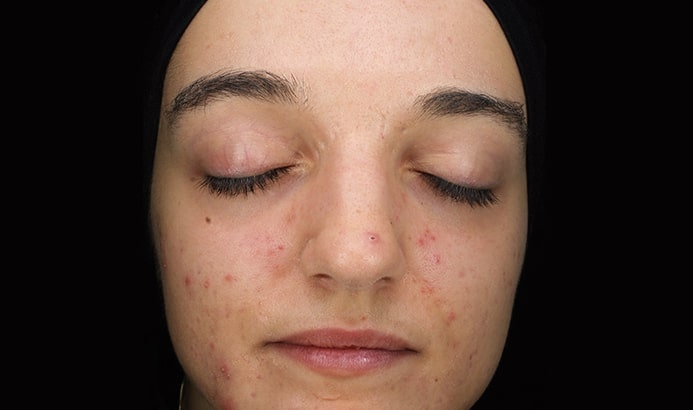It’s important to know how to get rid of spots as acne can affect us all and at any moment in our lives. It typically affects women more than men, and beyond the physical it can also have a social and emotional impact. Read on and we’ll tell you what it is, what causes it and what you can do to reduce your acne, and we’ll also recommend some effective acne treatment options.

What is acne?
Acne is an inflammatory skin condition where the pores become blocked with an excess of sebum, bacteria and dead skin cells. The type and level of obstruction will determine the severity of the acne and the type of lesion (these can be comedones, papules, pustules or nodules).1
This condition, which can affect any part of the body, is incredibly common: It affects 9.4%2 of the world's population and is the number 1 condition in Spain during the winter months, the third most common skin condition in Europe and the eighth worldwide.
What causes acne?
It has been proven that certain factors can foster the appearance of this condition:
- Diets containing a lot of carbohydrates, sugars and dairy products3 which stimulate the primary cause of acne related to insulin, growth hormones and IGF-1.4
- Hormonal imbalance, as acne is a condition relating to our endocrine system5. This why it not only appears in adolescents but also in adult women, often due to menstrual cycles, testosterone imbalance (such as in the case of polycystic ovarian syndrome), prolactin (a hormone produced throughout pregnancy and breastfeeding) or sex hormones. An excess of androgens can produce overproduction of oil and an increase in skin cells which can block hair follicles.
- Stress. Largely connected to the previous point, stress raises our cortisol levels. This hormone causes inflammation and sebum production. Stress can also impact on the immune system which can, in turn, reduce your body's ability to combat acne on its own.
- Bacterial dysbiosis of the skin's microbiome which is characterised by an increase in C. acnes bacteria, responsible for secreting substances that increase inflammation. This dysbiosis is also related to an imbalance of the gut flora and immune system.
- Excessive sweating and humidity, both of which can also block pores when not adequately dealt with.
- Use of specific products, often skincare products, which are comedogenic (which block the pores) or oily (such as oils).
How to stop acne?
Follow this advice if you're looking to reduce your acne:
- Follow an adequate diet which is low in carbohydrates, dairy products, additives and refined ingredients, as diet plays a key role in keeping acne at bay.
- Cleanse your skin thoroughly twice a day with products that don't dry it out. Stick to gentle exfoliants to unblock your pores and clear away dead skin cells.
- Don't rub your skin or squeeze your spots! Touching the skin causes irritation and can spread spot-causing bacteria and make your skin worse. It also slows down the scarring and healing process.
- Use non-comedogenic products on the skin on your face and remember to always remove your makeup before going to bed.
- Reduce your stress.
- Balance your skin's microbiome with probiotics, prebiotics and antimicrobial molecules.
- Follow a beauty routine which works for you and which includes topical retinoids, sun protection, antioxidants and ingredients which stabilise your skin's barrier.
- In the case of severe acne, consult a medical professional who can evaluate the need for oral antibiotics.
How to get rid of spots quickly?
Moving beyond these general recommendations, we also suggest some effective product and treatment options.
Products for acne
Here at mesoestetic®, we recommend blemiderm®, a new generation of complete product solutions for acne. The range includes blemiderm® resurfacing gel with salicylic and glycolic acids, blemiderm® treatment, a night cream containing 10% azelaic acid and retinol which works to clear the pores and reduce sebum, blemiderm® local control, a fast-acting gel for one-off imperfections and blemiderm® caps, a supplement rich in probiotics, prebiotics, biotin and zinc to support your gut flora.
Professional acne treatment
blemiderm®: professional acne treatment
In severe cases of acne, we recommend blemiderm®. This treatment for spots consists of three medical consultation sessions followed by a pack for use at home. We also recommend the mesopeel® blemiskin peel, carried out by a professional aesthetician, which has anti-inflammatory and anti-bacterial effects, or the mesopeel® MD blemiskin peel, carried out by a medical doctor, which contains 30% salicylic acid, retinal and shikimic acid.
Before and after results: remove acne with blemiderm®
We hope that reading this blog has given you some great tips to remove acne. Get rid of those spots once and for all!
We always recommend consulting a healthcare professional who can advise your particular case.
References
1 https://www.elsevier.es/es-revista-offarm-4-articulo-acne-13065401
2 https://doi.org/10.1111/bjd.13462
3 https://pubmed.ncbi.nlm.nih.gov/30859308/
5 https://revista.asocolderma.org.co/index.php/asocolderma/article/view/1624

Mª Carmen Vaquero
Graduate in Pharmacy, specialised in dermocosmetics
Mª Carmen Vaquero completed a master's degree in cosmetic development in Barcelona.












